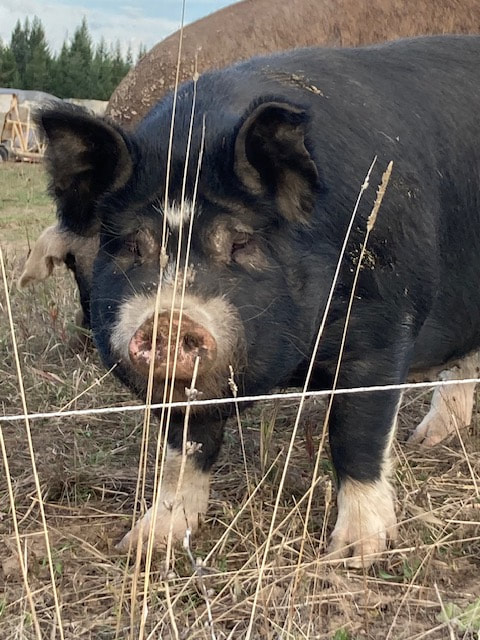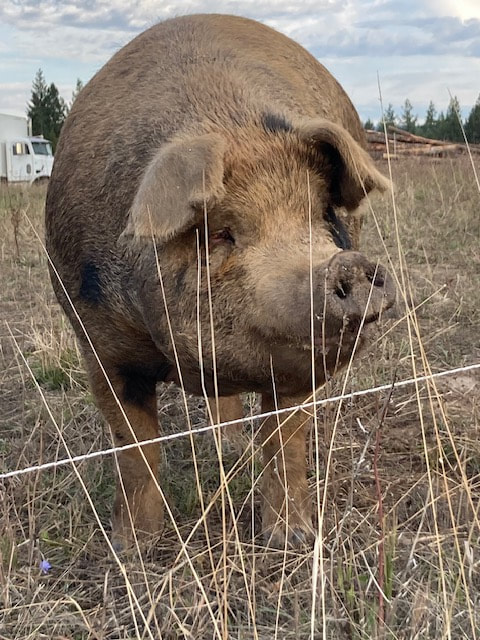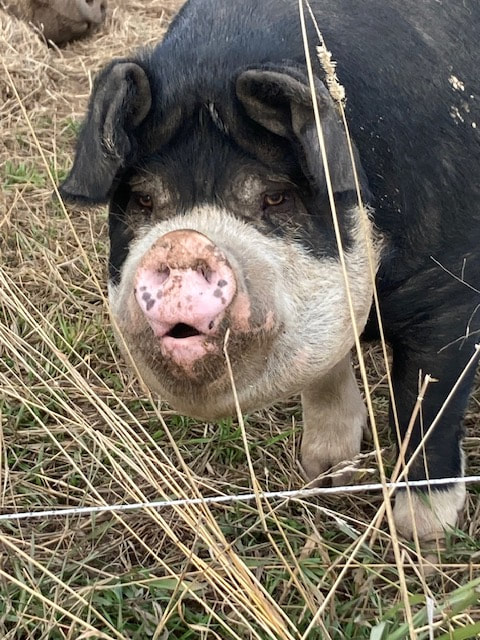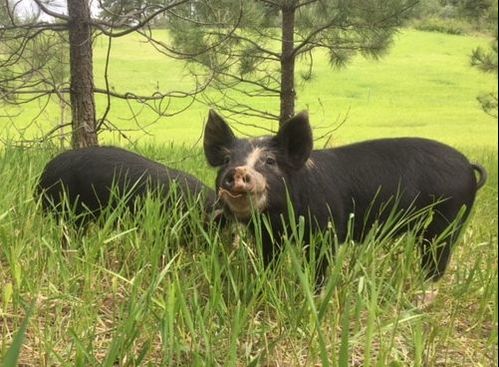Pigs in the Pasture
Most people can easily imagine a herd of cows grazing on grass, but pigs? Check out our pigs happily munching on grass in this video!
|
|
Pigs are intelligent creatures that require mental stimulation to thrive. A pasture environment allows pigs to fully realize their resourceful foraging, rooting, and wallowing instincts. It wasn't so long ago that homesteaders would turn their pigs loose in the forest for the season to fatten on their own, only to sort and muster them up for slaughter when they were ready. Raising pigs in this traditional way keeps the animals healthy, happy and self-sufficient.
|
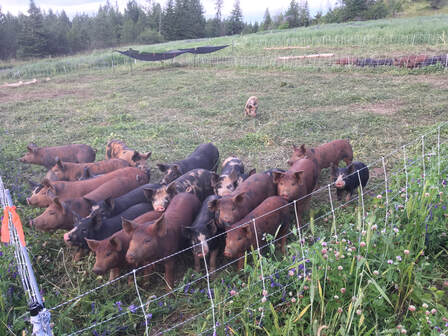 Texas Ridge Pasture pigs in our cover crop pasture
Texas Ridge Pasture pigs in our cover crop pasture
Life in the pasture isn't just what's best for the pigs...it's also excellent for the land. Adding pigs to our grazing program has boosted soil fertility in an extraordinary way. Pigs perform the critical tasks of cultivation and fertilization to restore overgrown areas with excess compaction or poor fertility. They clear overgrown forest to mitigate fire hazard and help convert decaying wood into soil. They help eradicate harmful plant pests that live in the soil and even seem to target some noxious weeds like ventanata grass. We even employ them as "rototillers with a pulse" from time to time, utilizing their rooting instincts to cultivate garden patches and their wallows to develop ponds!
Rotationally grazing pigs
|
Here's a quick look at us setting up a new paddock for the pigs. Each paddock is made up of seven 100-foot sections of Premier 1 Pig QuickFence plus with a single polywire hot wire inside about 12 inches away from the quickfence. Six sections of quick fence make up the perimeter, and one section divides the paddock into two 100-foot square paddocks.
|
Here's another paddock move. There are 57 pigs in that paddock, all trained to look forward to the next paddock for fresh forage.
|
What are Texas Ridge Pasture Pigs?
|
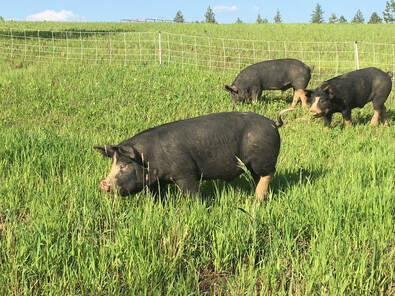
At Texas Ridge, we have been selectively breeding our pasture pigs from heritage hog genetics for nearly a decade, and through dozens of generations we now have our own breed known as the Texas Ridge Pasture Pig. They come in primarily red and black from the Berkshire and Red Wattle Hog influence, but they also come spotted or solid. They consistently finish on pasture with non-GMO grain supplementation to a hang weight of 175-200 pounds in 7-8 months.
Texas Ridge Pastured pork possesses some of the best flavor, tenderness and most delicious fat you've ever tasted. We typically harvest every pig we farrow, but in the event we have piglets available for sale, we keep a list of interested producers who would like to raise their own Texas Ridge Pasture Pigs.
Texas Ridge Pastured pork possesses some of the best flavor, tenderness and most delicious fat you've ever tasted. We typically harvest every pig we farrow, but in the event we have piglets available for sale, we keep a list of interested producers who would like to raise their own Texas Ridge Pasture Pigs.
Foundation breeding stock
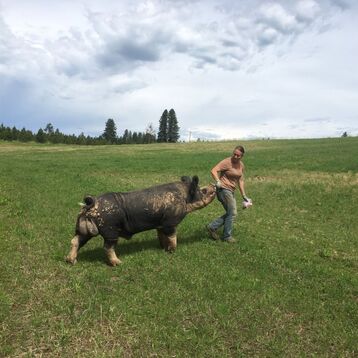 Leading Mo to a new paddock
Leading Mo to a new paddock
Berkshire Pigs
Meet Mo, the 850 pound purebred Berkshire boar whose genetics have significantly influenced our pig herd. Berkshires are a rare breed that have been favored for centuries for their outstanding meat qualities. In Japan, Kurobuta pork, which comes from purebred Berkshires is considered to be the Kobe beef of pork. We also love Berkshires for their relatively short snout that makes them better grazers. Mo's breeding brings outstanding carcass quality, intramuscular fat, improved finish times, juiciness and tenderness to all of the pork we produce. In spite of his intimating size and protruding tusks, Mo is a gentle giant who is safe with children and piglets alike.
Meet Mo, the 850 pound purebred Berkshire boar whose genetics have significantly influenced our pig herd. Berkshires are a rare breed that have been favored for centuries for their outstanding meat qualities. In Japan, Kurobuta pork, which comes from purebred Berkshires is considered to be the Kobe beef of pork. We also love Berkshires for their relatively short snout that makes them better grazers. Mo's breeding brings outstanding carcass quality, intramuscular fat, improved finish times, juiciness and tenderness to all of the pork we produce. In spite of his intimating size and protruding tusks, Mo is a gentle giant who is safe with children and piglets alike.
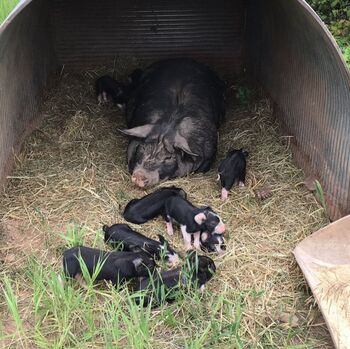 Shorty and piglets
Shorty and piglets
Idaho Pasture Pigs (IPPs)
The IPP is a relatively new breed that was developed by combining 3 breeds, Duroc, Berkshire, and Kune kune. They are smaller framed pigs with short snouts that prefer grazing to rooting. Because the breed was created by crossing 3 breeds, IPP breeders today continue to select the phenotype they prefer expressed from the cross. While many breeders are attracted to IPPs that express the Kune Kune phenotype, we prefer pigs that express more of the Berkshire phenotype, which have a larger carcass and faster growing time. Our foundation IPPs are crossed with Berkshire again. IPPs tend to be extremely athletic, and we often see them run and jump out in the pasture. Click here to see them in action! Our foundation IPP sows were Twoface, Shorty, and Stripe.
The IPP is a relatively new breed that was developed by combining 3 breeds, Duroc, Berkshire, and Kune kune. They are smaller framed pigs with short snouts that prefer grazing to rooting. Because the breed was created by crossing 3 breeds, IPP breeders today continue to select the phenotype they prefer expressed from the cross. While many breeders are attracted to IPPs that express the Kune Kune phenotype, we prefer pigs that express more of the Berkshire phenotype, which have a larger carcass and faster growing time. Our foundation IPPs are crossed with Berkshire again. IPPs tend to be extremely athletic, and we often see them run and jump out in the pasture. Click here to see them in action! Our foundation IPP sows were Twoface, Shorty, and Stripe.
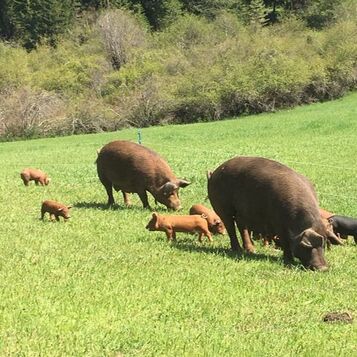 Ruby and Earthmover
Ruby and Earthmover
Red Wattle Hogs
An endangered heritage breed, Red Wattle hogs are known for their award winning flavor and carcass traits, even on a pasture-based diet. They are quite smart and are much harder to manage in a conventional system, which is fine for us since we don't run one! Learn more about Red Wattles here. Their mothering instinct is second to none, and they are fiercely protective of every piglet we raise. Nothing messes with our red wattle girls. Our foundation Red Wattle Hog sows were Ruby, Earthmover and Garnet, and their offspring Elle, and Little Elle.
An endangered heritage breed, Red Wattle hogs are known for their award winning flavor and carcass traits, even on a pasture-based diet. They are quite smart and are much harder to manage in a conventional system, which is fine for us since we don't run one! Learn more about Red Wattles here. Their mothering instinct is second to none, and they are fiercely protective of every piglet we raise. Nothing messes with our red wattle girls. Our foundation Red Wattle Hog sows were Ruby, Earthmover and Garnet, and their offspring Elle, and Little Elle.
Mothering the next generation
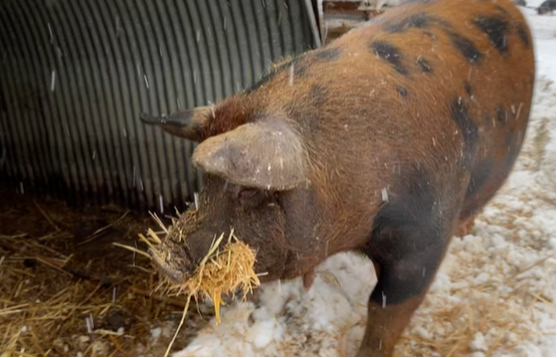 Little Elle bringing more straw to the piglets in her hut to keep them warm in a spring storm.
Little Elle bringing more straw to the piglets in her hut to keep them warm in a spring storm.
Maternal instinct is another hallmark of heritage breed pigs, which matches our philosophy that pigs should be able to birth and mother their offspring with minimal intervention from us.
Our sows do a fantastic job keeping their piglets safe, without farrowing crates or elaborate containment systems. They give birth and rear their piglets with other sows and their piglets nearby. The other sows help "babysit" all of the piglets, keeping a sharp eye out for anything that looks like trouble.
Any sow who kills, injures her piglets or piglets belonging to another sow, or who fails to wean her piglets is culled to ensure only the best maternal traits persist.
Our sows do a fantastic job keeping their piglets safe, without farrowing crates or elaborate containment systems. They give birth and rear their piglets with other sows and their piglets nearby. The other sows help "babysit" all of the piglets, keeping a sharp eye out for anything that looks like trouble.
Any sow who kills, injures her piglets or piglets belonging to another sow, or who fails to wean her piglets is culled to ensure only the best maternal traits persist.
Simply better...for everyone
|
Not only is life in the pasture better for the animals, it's better for the people too. Check out some of these great articles that discuss the health and environmental benefits of pastured pork.
Pasture-Raised Pork Benefits and Why You Should Switch 5 Reasons to Switch to Pastured Pork |
Products
|
Animals
|
|
